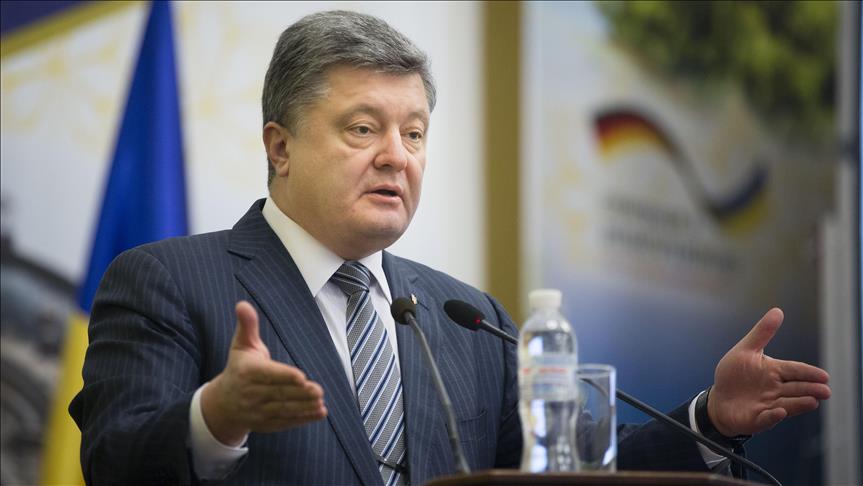Ukrainian President says fighting has not abated, weapons still crossing border
Ukrainian President says fighting has not abated, weapons still crossing border
 President of Ukraine Petro Poroshenko delivers a speech during the meeting of the Association of Ukrainian Cities, in Kiev, Ukraine on January 23, 2016. (Presidency of Ukraine Press Office - AA)
President of Ukraine Petro Poroshenko delivers a speech during the meeting of the Association of Ukrainian Cities, in Kiev, Ukraine on January 23, 2016. (Presidency of Ukraine Press Office - AA)
BERLIN
Ukrainian President Petro Poroshenko on Monday accused Russia of trying to destabilize his country through military support for separatists in the country’s east.
Speaking at a news conference in Berlin with German Chancellor Angela Merkel, Poroshenko said Russia and the separatist groups it supports in the Luhansk and Donetsk regions were not observing a cease-fire agreed last February and Russia was continuing to move troops and weaponry across the border.
“Russia and the militants are evidently not interested in peace and stability in Donbass,” he said, using a terms to refer to the eastern provinces. “For Russia, the conflict in Donbass is instrumental to keep destabilizing Ukraine.”
Despite last year’s Minsk agreement, Russian-backed separatists have stepped up attacks on Ukrainian government troops in recent weeks.
“The Ukrainian people and me as the Ukrainian president don’t see any alternative to the Minsk agreement,” Poroshenko said. “We are fully committed to implement it in full and demand the same from the Russian side.”
The president called for international sanctions against Russia to continue until Moscow and its proxies in eastern Ukraine implement the deal.
Merkel said Germany would seek a political solution to the conflict through talks with Russia.
More than 8,000 have been killed in eastern Ukraine since fighting broke out in April 2014, according to the UN.
“We had to prolong the sanctions because the Minsk process has not been implemented yet,” Merkel said. “These sanctions are linked to the implementation.”
In December, the EU extended economic sanctions against Russia -- first imposed following the Russian annexation of Crimea from Ukraine in March 2014 -- to the end of July.
The peace deal signed in Belarusian capital Minsk called for a cease-fire and the withdrawal of heavy weapons as well as for the removal of foreign troops and for Ukraine’s border to be returned to government control. However, the agreement has had little effect on the conflict.
Anadolu Agency website contains only a portion of the news stories offered to subscribers in the AA News Broadcasting System (HAS), and in summarized form. Please contact us for subscription options.







